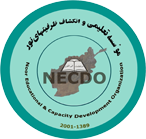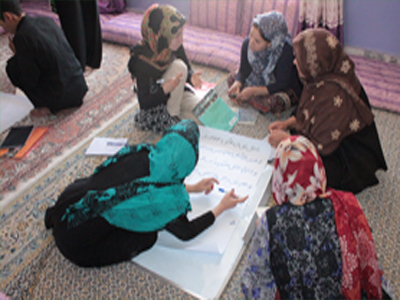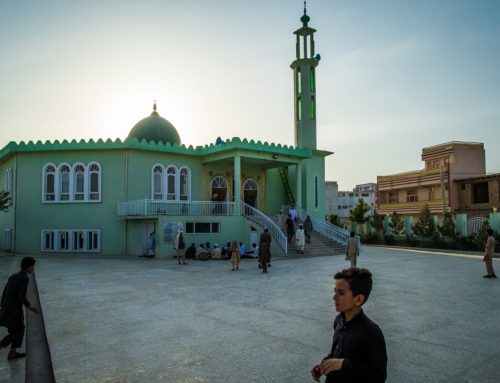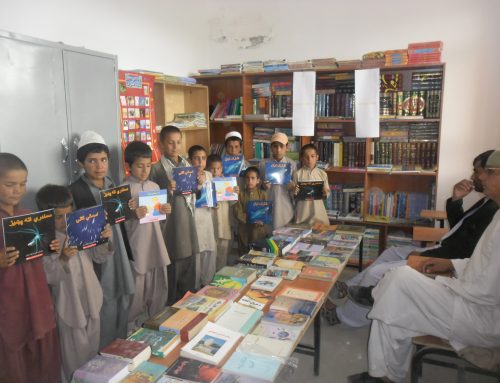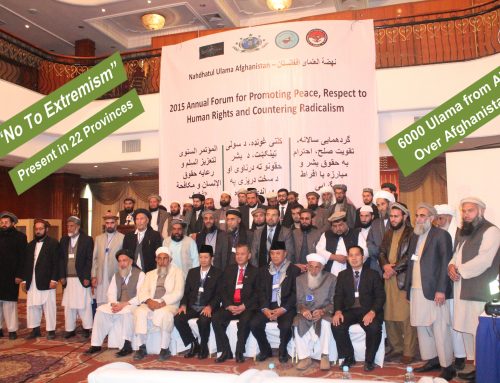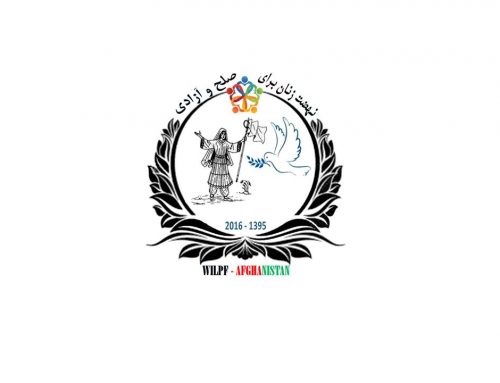Preparations before the start of the Trainings:
1.2 Recruitment of staff:
Based on NECDO HR policies and the project activity plan, we hired the project staff. Ms. Parina Jahid the project manager, Ms. Masooda Waisey Trainer, Mr. Hayat Trainer, Mr. Naseer Ahmad Finance Admin officer and Mr. Fazel as guard. The trainers are mobile team stationed in Kabul and move around to conduct the trainings in the target provinces according to the plan.
2.2 Orientation and TOT for the new staff:
The TOT and orientation on the project was given to the staff based on the plan, goal and objectives as well as the activities of the project were explained to the recruited staff in order to make the project a real success the team work was insisted by NECDO top management and the trainers. Each employee was given a TORs and contracts with a probation period of 3 months for one-year contracts according to NECDO HR policies were signed and put into to the profile of the staff.
3.2 Coordination and Networking for identification Imams and women activists:
NECDO based on the past experience with contact MoRA and MoWA to issue us support letters and introduce Imams and women (women are introduced by provincial department of MoWA, they introduce women from the women department, other local government institutions and the CSOs and women activist in the province), also we contacted NECDO’s Imams Volunteer Network, (this network has been established since 2007 under Imam Initiative for elimination of violence against women. It is now expanded to a larger scale of more than 6000 imams in more than 25 provinces with 5 core principals of moderation, social justice, tolerance, equality and participation) in order to identify the Imams. We also conducted networking meetings with government-concerned department in the MoRA. In our past experience we receive support letter from related ministry to the provincial directorates of each province and based on the prior communication with the related department we organized ground activities. Before the advent of the workshop our mobile team leave at least two days earlier for on the ground checking of the logistical and administrative and security arrangements and after assurance the delegation they move. We also inform government-concerned departments for security reasons before the delegations move. The trainings are for two full days followed by follow up meetings in order to find the gaps and shortcomings in regards to the women participation and their meaningful role in the peace and reconciliation process, and the symbolic role given to women in the development of the country in the respective province and to find suitable solutions to these gaps by taking the participants own views. The Provincial Community Development Group (The CDGs in the target provinces will be advocates for women rights, and their meaning role in the peace and reconciliation, they will have time to time follow up with the local government authorities as well as the CSOs on national and international level operating in their respective provinces, NECDO will also be engaging these CDGs on local and national level to promote the cause of Afghan women and elimination of al sorts of discrimination against her) established and interlinked for future cooperation and communications with NECDO main Office.
4.2 Administrative Arrangements and Preparations:
NECDO admin developed all the required formats for the trainings such as the evaluation papers, attendance sheets, training sessions timetable, post-test, pre-test commitment sheets for the beneficiaries as well as did all the arrangements for networking meetings with the concerned government institutions such as MoWA, and MoRA. Networking meetings were held with the mentioned ministries and they were also given orientation on the goal and objectives of the project. Both the two ministries issued their support letters to the provincial departments in Kabul, Khost, Paktia and Kandahar. It is necessary for NECDO team, when going to the province, to have this letter while doing networking with the provincial departments of the concerned ministry. NECDO administration also did all its logistic preparation, supplied the office stationary, training stationary and made the copies and printing of the all the documents required during the workshops. Power points presentations for the sessions and supplementary materials during the training sessions in the workshops were developed and prepared in the required quantity. Posters for public awareness rising on the protection of women rights were designed and printed in big number in both national languages (Dari and Pashto) to be distributed to and through the beneficiaries during the workshops in all the 4 target provinces. Banner was designed and printed in medium size to be used in the training halls during the workshops with the title of “Promoting Women’s Rights and Role in Peace Building in Afghanistan”, having the logos of both NECDO and D&P.
5.4 Standard Training Manual Developed and Printed:
A consultant was hired to further work on a standard manual considering the goal and objectives of the project and to ensure Promoting Women’s Rights and Role in Peace Building in Afghanistan keeping in sight the national, international laws, conventions and declarations as well as five core rights of women in Islam (Right to Education, Right of Marriage-Divorce, Right of Ownership (Possession), Right of social and political participation and Right of Inheritance), Resolution 1325UNSCR, Sustainable Development Goals and Peace education in both national languages Dari & Pashto languages.
3. Imam Initiative Training for Promoting Women’s Rights and Role in Peace Building in Afghanistan
Noor educational & capacity development ORGANIZATION (NECDO) started its preparation for Imam Initiative Training for Promoting Women’s Rights and Role in Peace Building in Afghanistan. Leader to Promote Women’s
The preparation for the workshops planned on the following dates:
Kabul:
| No | Date Workshop Conducted | Number of Participants Female | Number of Participants Male (imams) |
| 1 | 1st September 2019 | 10 | 15 |
| 2 | 3rd September 2019 | 15 | 10 |
| 3 | 8th September 2019 | 10 | 15 |
| 4 | 15th September 2019 | 15 | 10 |
| Total: | 50 | 50 | |
| G. Total: 100 Beneficiaries | |||
Khost:
| No | Date Workshop Conducted | Number of Participants Female | Number of Participants Male (imams) |
| 1 | 16th Nov 2019 | 0 | 25 |
| 2 | 20th Nov2019 | 0 | 25 |
| 3 | 2nd Dec 2019 | 25 | 0 |
| 4 | 14th Dec2019 | 25 | 0 |
| Total: | 50 | 50 | |
| G. Total: 100 Beneficiaries | |||
- Preparing of participants list, registration list, and agenda
- Logistic preparation for the Workshop
- Technical preparations
- Administrative and financial preparation
- Communication through emails and phone with the participants.
1.3 Topics Covered During the Training:
1 Peace Education
2 Women’s right to participate in political and social affairs
3 Five rights of women in Islam,
4 Women Role and Responsibilities towards herself and the community
5 Introduction of sustainable development goals
6 Introduction of resolution UNSCR 1325
2.3 Explanation:
The Workshops of Imam Initiative Training for Promoting Women’s Rights and Role in Peace Building in Afghanistan were arranged according to the plan in 2 provinces of Kabul and Khost Sep-Dec 2019 for 100 Imams’ introduced by MoRA and PD of MoRA of Khost Province and 100 women from government and non-governmental sectors and civil society activists. The workshops started according to the agenda and the timetable. The opening of the trainings was done in by Ms. Parina Jahid the PM of AF3623 the trainees were welcomed and both D&P and NECDO were introduced through a PPP. Ms. Masooda Waisy NECDO Master Trainer began with the first session of the agenda, after that Mr. Hayat provided a brief speech about the goal and objectives of the workshop. He emphasised, that through this program we want to establish a strong network of 100 persons in each province to achieve the goal and objectives set for this project. Mr. Hayat did group work with the participants under topic of women’s right to participate in political and social affairs after that Ms. Masooda Waisy present presentation on the five rights of women in Islam then Mr. Hayat continued with the topics of the workshop and applied modern participatory methodology of Q+A, group work and the work was presented to the all by each group. In the following day Group Discussion on Women Role and Responsibilities towards herself and the community and also he introduced Sustainable Development Goals to the participants. Consequently Ms. Masooda Waisy introduced resolution 1325 UNSCR and give awareness on the role of women in peace and security in the international and national conventions as well the NAP.
3.3 Focussed Group Discussion:
In the second half of the following day, the focus group discussion was conducted at first the facilitator read the question one by one and the participant provided their answers regarding the questions and give their own idea most of the participants said that government should pave the way for the participations of women in peace process and also Ulama have important role to convince people and the communities to allow and support women participate in peace negotiation and government should involve and appoint religious women in high position, so that the propaganda of the extremist groups could be reduced to some level.
4.3 The following questions were raised:
- What do you think are the main obstacles to the Afghanistan peace process?
- How can women contribute to the Afghanistan peace process?
- How can women protect and defend the achievements of the last two decades in terms of their rights and political participation in the peace process?
4.What is the key role of women and youth in Afghanistan’s peace and the stability process?
- What is the fundamental role of religious scholars in the Afghan peace process?
- What are the scholars’ initiative to strengthen women’s rights and their role in the Afghan peace process?
5.3 Participants Views about Workshop:
Kabul:
1-One of participant said, “This workshop was good and informative, and the topics presented were really useful, the exchanged of ideas and information about 1325 UNSCR was something new and interesting”.
2-Another participant said, “The program was very useful and different especially the women’s role in peace and security is an important issue for our society”.
3-One of the participant said, “In general the program was very good and informative especially information on 1325 UNSCR was very interesting for me, and my suggestion is that a network of Ulama and those women who works for peace building can be established in order to work for a better change of mentalities in grassroots’ level as well as a policy making level”.
One the participant said, “As women made up half of society they should be allowed to participate in the peace process and women’s political and social activities 18 year should be taken into account moreover should be given the right of social and political activities after the peace process”.
5- One the participant said, “The scholars must play the role of repairing of the country and must answering their destructive consequences and the government in consolation with the scholars has taken the necessary steps in advancing this process to say the right and the defects of the government and the opposition and make both parties aware of their religious and secular responsibility”.
Khost:
1-One of participant said, “The presence of women in the peace process is beneficial for the community according to the political and social right that Islam has given them their presence in the peace process should not be over looked, the first and most affected victims of the war are women, so therefore women participation must be meaningful”.
2-Another participant said, “Because women is a mother she can play a key role in peace process and also peace can be made by a women between her family her children and then they can play an important role in her community, too”.
3-One of the participant said, “Basic obstacles to peace process are”.
- Lack of honesty and compassion in both sides of the conflict
- Proxy war (the interest of the powers around the country)
- Lack of a legal system (the absence of rule of law)
- Lack of education (the absence standard education facilities in particular for women)
- Ignorance (due to bad cultural norms)
- Lack of religious and Islamic awareness (the radical interpretations by some groups)
4- One the participant said, “The initiative of the scholars, they must create a union of the religious women or scholar women in this process to participate in this process by advocating for their rights and their role in the society”.
5- One of the participant said, “Lack of awareness of the sacred religion of Islam is the only major obstacle to the peace process in the country. For example in the process of peace with the Taliban if government send religious scholar who can debate from Islamic point of view with the Taliban, would be more effective”.
6.3 Lesson learned:
The lessons learned from the 8 rounds of workshops conducted in Kabul and Khost provinces are taken form participants views during the debates and discussions in various sessions of the training as well as the Group Discussion.
Kabul:
- Women should be aware about their right according to Islam, laws and international conventions
- Imams should train women for better achievement and give them chances to build their capacity.
- Government should involve religious women in high position.
- Imams have important role in our society and must respect them.
- Government should pave the way for the participations of women in peace process.
Khost:
- Scholars have important social and political role to promote peace among the people.
- The main obstacles are those who are at the forefront of power (those who lose their business and economy they made in the war).
- Ulama should be convergent supportive and accountable in promoting women’s rights.
- First Convergence with women respect for good deeds and cooperation with one another.
- The important role of scholars in the process of protecting the people and their locations and mosques.
7.3 Outcomes of the Workshops:
The following outcomes were achieved through training;
Ø Improved knowledge and understanding of women who participated in the workshop of their role in peace process as well as their rights in social and political participation
Ø Enhancement of the participants’ soft skills in particular towards women’s role in peace and women’s rights
Ø Enhancement of the participants networking skills
Ø Establishment of a Community Working Group in the target province
Ø Based on the regular request from the participants a certificate for the attendance and participation was issued to each of the trainees.
